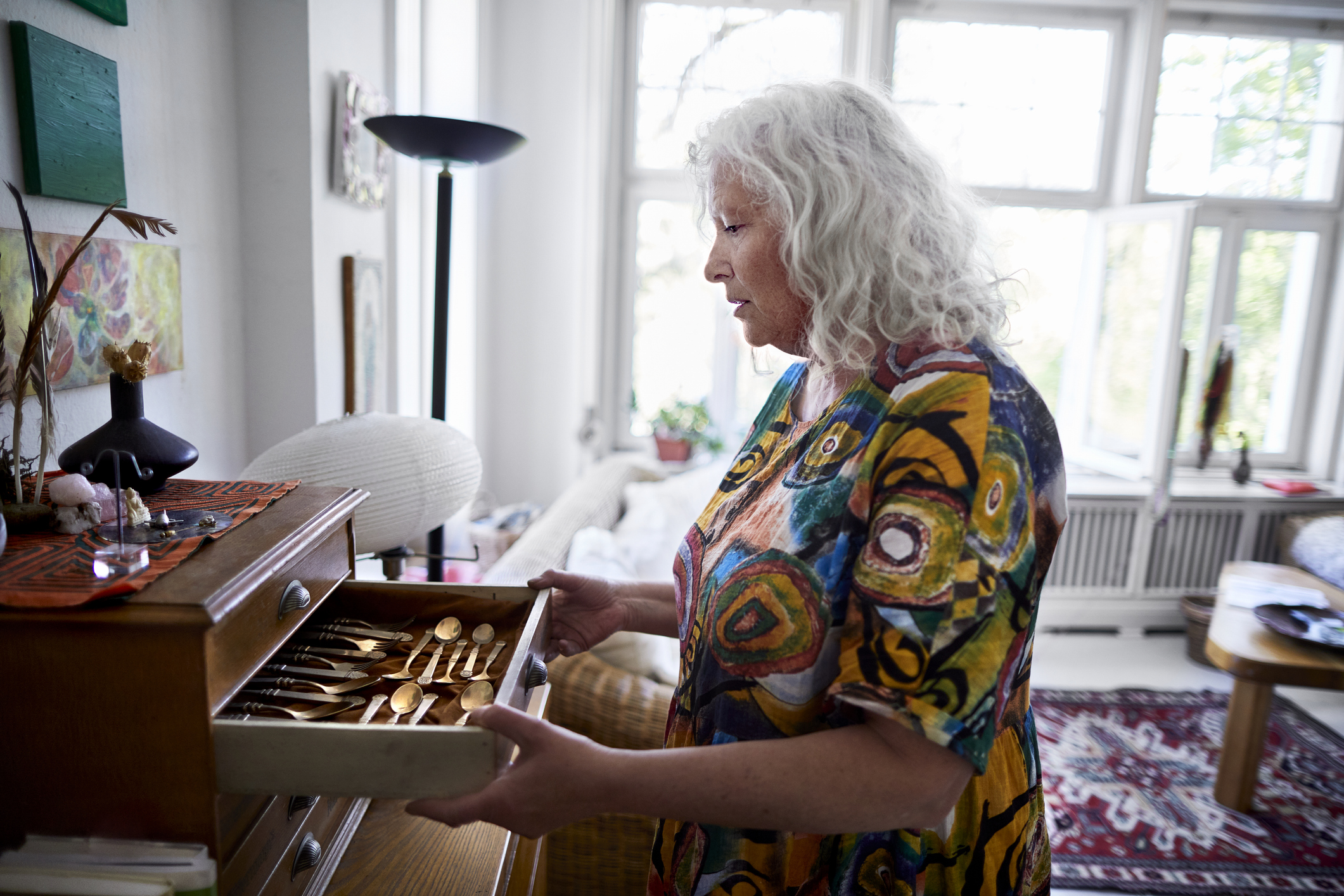Spoiling the Grandkids
When my children were younger, their grandparents in New York kept a scrapbook of their favorite comic strips to read aloud when the kids came to visit.

Profit and prosper with the best of Kiplinger's advice on investing, taxes, retirement, personal finance and much more. Delivered daily. Enter your email in the box and click Sign Me Up.
You are now subscribed
Your newsletter sign-up was successful
Want to add more newsletters?

Delivered daily
Kiplinger Today
Profit and prosper with the best of Kiplinger's advice on investing, taxes, retirement, personal finance and much more delivered daily. Smart money moves start here.

Sent five days a week
Kiplinger A Step Ahead
Get practical help to make better financial decisions in your everyday life, from spending to savings on top deals.

Delivered daily
Kiplinger Closing Bell
Get today's biggest financial and investing headlines delivered to your inbox every day the U.S. stock market is open.

Sent twice a week
Kiplinger Adviser Intel
Financial pros across the country share best practices and fresh tactics to preserve and grow your wealth.

Delivered weekly
Kiplinger Tax Tips
Trim your federal and state tax bills with practical tax-planning and tax-cutting strategies.

Sent twice a week
Kiplinger Retirement Tips
Your twice-a-week guide to planning and enjoying a financially secure and richly rewarding retirement

Sent bimonthly.
Kiplinger Adviser Angle
Insights for advisers, wealth managers and other financial professionals.

Sent twice a week
Kiplinger Investing Weekly
Your twice-a-week roundup of promising stocks, funds, companies and industries you should consider, ones you should avoid, and why.

Sent weekly for six weeks
Kiplinger Invest for Retirement
Your step-by-step six-part series on how to invest for retirement, from devising a successful strategy to exactly which investments to choose.
When my children were younger, their grandparents in New York kept a scrapbook of their favorite comic strips to read aloud when the kids came to visit. Meanwhile, theirPittsburgh grandparents sent them copious clippings about the Steelers, the kids' favorite football team.
Both sets of grandparents bought traditional presents as well, but it was those gifts of time and thoughtfulness that were most memorable. And that's worth keeping in mind this holiday season, when gift-giving by grandparents, well-intentioned and generous as it may be, can cause tensions on both sides of the generation gap.
Spirit of giving. In a recent survey by AARP Financial, 79% of the grandparents said that their grandkids don't understand the value of a dollar. (And they often say the same about their adult children. "We did too much for our grandchildren, and their parents didn't appreciate it," one unhappy grandmother complained to me.)
From just $107.88 $24.99 for Kiplinger Personal Finance
Become a smarter, better informed investor. Subscribe from just $107.88 $24.99, plus get up to 4 Special Issues

Sign up for Kiplinger’s Free Newsletters
Profit and prosper with the best of expert advice on investing, taxes, retirement, personal finance and more - straight to your e-mail.
Profit and prosper with the best of expert advice - straight to your e-mail.
But grandparents can also be part of the problem. In the AARP survey, the typical grandparent had a median income of $46,000 and spent $600 a year on the grandchildren; grandparents with incomes of $75,000 or more spent more than twice that amount. Nearly 60% worry about spoiling their grandchildren -- and not without reason. As one parent told me, "I'm trying to teach my 13-year-old daughter that she can only spend what she has, but my in-laws always seem to sneak money to her."
Yet grandparents do have a need to indulge their grandchildren. In the AARP study, more than 80% said they give because it makes them happy.
Buying guides. So how do you treat the grandkids without going overboard? And how do you encourage your adult children not to take your generosity for granted?
First, discuss big purchases with your children. They may not want Johnny to have a new video-game system, but would welcome a new computer. One grandmother limits gifts to $25. "The kids happily make their purchases or save the money, and in return I have their love, attention and time together."
Think college savings. This is a hat trick for all three generations: Mom, Dad and the kids get help with tuition, and grandparents get a multitude of tax breaks. You can open state 529 college-savings accounts for your grandchildren, and in more than half of the states and the District of Columbia you'll qualify for a state tax deduction.
Plus, you can move money out of your estate -- contributing up to $60,000 (or $120,000 from both of you) at one time for each child and averaging the gift over five years -- while avoiding the gift tax and keeping control of the money. You can switch beneficiaries or get your money back by paying income tax and a 10% penalty on the earnings. And the federal financial-aid application doesn't ask about grandparent-owned accounts.
Finally, think investing. McDonald's gift certificates may make a great stocking stuffer, but how about giving kids stock in the company? Using a discount broker such as ShareBuilder (www.sharebuilder.com), which has a $4 fee, keeps costs low for small purchases. Or consider a mutual fund with a low minimum investment, such as Hodges fund ($250 minimum) or Homestead Value ($500).Custodial accounts aren't as attractive now that kiddie-tax rules have been tightened. But they're fine for small gifts or as a teaching tool. Cultivating a common interest with grandkids is a great way to turn them into investors -- or lifelong Steelers fans.
Profit and prosper with the best of Kiplinger's advice on investing, taxes, retirement, personal finance and much more. Delivered daily. Enter your email in the box and click Sign Me Up.

Janet Bodnar is editor-at-large of Kiplinger's Personal Finance, a position she assumed after retiring as editor of the magazine after eight years at the helm. She is a nationally recognized expert on the subjects of women and money, children's and family finances, and financial literacy. She is the author of two books, Money Smart Women and Raising Money Smart Kids. As editor-at-large, she writes two popular columns for Kiplinger, "Money Smart Women" and "Living in Retirement." Bodnar is a graduate of St. Bonaventure University and is a member of its Board of Trustees. She received her master's degree from Columbia University, where she was also a Knight-Bagehot Fellow in Business and Economics Journalism.
-
 Tariffs: An Uninvited Valentine's Day Guest
Tariffs: An Uninvited Valentine's Day GuestExpect to pay more for flowers and chocolates this year or find creative alternatives to save on Valentine's Day without looking cheap.
-
 Should I sell my silverware and gold jewelry now that prices are high?
Should I sell my silverware and gold jewelry now that prices are high?My family silver and gold have sentimental value, but I hardly use them. Should I sell? We asked a professional metals dealer and investment adviser to weigh in.
-
 One Country Just Pushed the Retirement Age to 70. Is the US Next?
One Country Just Pushed the Retirement Age to 70. Is the US Next?These countries have the highest and lowest retirement ages in the world — but that doesn’t give the full picture of which is best and worst for retirement.
-
 9 Types of Insurance You Probably Don't Need
9 Types of Insurance You Probably Don't NeedFinancial Planning If you're paying for these types of insurance, you may be wasting your money. Here's what you need to know.
-
 Amazon Resale: Where Amazon Prime Returns Become Your Online Bargains
Amazon Resale: Where Amazon Prime Returns Become Your Online BargainsFeature Amazon Resale products may have some imperfections, but that often leads to wildly discounted prices.
-
 Roth IRA Contribution Limits for 2026
Roth IRA Contribution Limits for 2026Roth IRAs Roth IRAs allow you to save for retirement with after-tax dollars while you're working, and then withdraw those contributions and earnings tax-free when you retire. Here's a look at 2026 limits and income-based phaseouts.
-
 Four Tips for Renting Out Your Home on Airbnb
Four Tips for Renting Out Your Home on Airbnbreal estate Here's what you should know before listing your home on Airbnb.
-
 Five Ways to a Cheap Last-Minute Vacation
Five Ways to a Cheap Last-Minute VacationTravel It is possible to pull off a cheap last-minute vacation. Here are some tips to make it happen.
-
 How Much Life Insurance Do You Need?
How Much Life Insurance Do You Need?insurance When assessing how much life insurance you need, take a systematic approach instead of relying on rules of thumb.
-
 When Does Amazon Prime Day End in October? Everything We Know, Plus the Best Deals on Samsonite, Samsung and More
When Does Amazon Prime Day End in October? Everything We Know, Plus the Best Deals on Samsonite, Samsung and MoreAmazon Prime The Amazon Prime Big Deal Days sale ends soon. Here are the key details you need to know, plus some of our favorite deals members can shop before it's over.
-
 How to Shop for Life Insurance in 3 Easy Steps
How to Shop for Life Insurance in 3 Easy Stepsinsurance Shopping for life insurance? You may be able to estimate how much you need online, but that's just the start of your search.